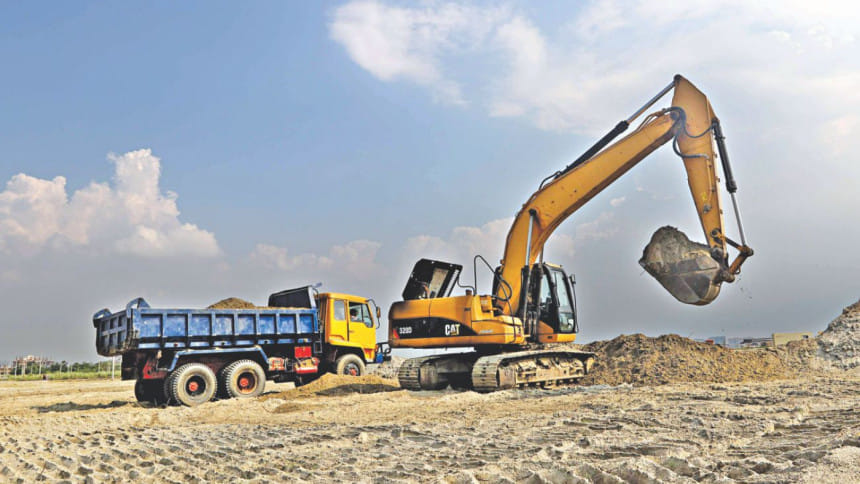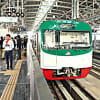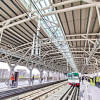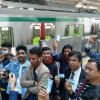PM opens work on metro, BRT

Prime Minister Sheikh Hasina yesterday inaugurated the construction work on the much-hyped first-ever metro rail service in the capital and the Bus Rapid Transit (BRT) from Hazrat Shahjalal International Airport to Gazipur.
She formally opened the construction work on these two mega projects, unveiling plaques digitally from the Bangabandhu International Conference Centre in the city.
The MRT Line-6 metro rail service is expected to open half of its 20.10 kilometers by the end of 2019.
Speaking on the occasion, Hasina said the government is working to develop a modern mass transport system, aiming to make the journeys of the people easier, nicer and more comfortable.
Regarding the construction work of package 3 and 4 under the MRT Line-6, the PM suggested the Ministry of Road Transport and Bridges for stretching the line and station from Uttara North to Farmgate instead of Agargaon, considering the facility of the commuters.
The entire metro rail route and its all 16 stations will be elevated as well. Only the depot will be on the ground. A formal commencement of ground development for a depot began yesterday. The depot is the foremost component to be in place for building the metro rail service system.
Dhaka Mass Rapid Transit Development Project, official name of the metro rail scheme, stretches from Uttara to Motijheel.
The Tk 21,985.07 crore ($2.5 billion) ambitious metro rail project is expected to provide an improved, safe, faster and affordable but modern means of urban public transport service significantly reducing the perennial traffic congestion in the capital and prevent environmental pollution, said eminent transport engineering expert Prof Shamsul Hoque.
With every metro rail train comprising six air-conditioned spacious cars, a city commuter will travel between Motijheel and Uttara North in 38 minutes, and there will be a train in every four minutes at each of the 16 stations on the way in both directions. Twenty four trains will together transport 60,000 passengers every hour on both directions.
A 10km metro rail service, including 5km from the depot to Pallabi and another 5km from Pallabi to Agargaon, will be ready for operation by the end of 2019, and the following year, the entire 20km metro system will be ready for use.
The entire project is being implemented under eight separate contracts, including four for building the 20km elevated overpass. The 16 stations would be in Uttara North, Pallabi, Mirpur, Kazipara, Shewrapara, Agargaon, Rokeya Sharani, Bijoy Sharani, Farmgate, Karwan Bazar, Shahbagh, Dhaka University, Bangladesh Secretariat and Motijheel.
The fifth part will be on the construction of a viaduct and stations from Agargaon to Karwan Bazar and the sixth on similar construction from Karwan Bazar to Motijheel.
The seventh will be electrical and mechanical work, and the eighth procurement of 144 metro rail cars. Procurement of 24 locomotives and the cars will go on simultaneously and be delivered by the second half of 2019.
The project is being implemented by government-owned Dhaka Mass Transit Company Ltd while Dhaka Transport Coordination Authority is supervising.
A consortium of consultants, led by Nippon Koei Ltd of Japan and including Nippon Koei India Ltd, Delhi Metro Rail Corporation Ltd, Mott MacDonald Ltd India, Mott MacDonald Ltd UK and Development Design Consultants Ltd Bangladesh, was hired in November 2013 for general consultancy. They are taking care of the project's design, construction supervision, procurement support and management of work.
Of the estimated total project cost of Tk 21,985.07 crore, the Japanese government through JICA will provide Tk 16,594.59 crore of the project's total cost as soft loan, while the Bangladesh government will provide the rest of Tk 5,390.48 crore.
Meanwhile, the Road Transport and Highways Division will implement the Greater Dhaka Sustainable Urban Transport Project (BRT, Gazipur-Airport) by December 2018 with an estimated cost of Tk 2039.85 crore.
Of the total project cost, Tk 389.15 crore will come from the national exchequer while the rest of Tk 1650.70 crore will come from the project assistance from the Asian Development Bank, French Development Agency and Global Environment Facility Fund.
There will be 25 stations, six flyovers, 4.50km elevated BRT lane from Uttara to Tongi and 16km flat grade on the route.
Besides, an 18-metre-long 100 articulated buses will run on the route. There will be an electronic smart card system for collecting bus fare.
Once the project is completed, it would take only 50 minutes to travel from Gazipur to airport with the frequency of buses between 2 and 5 minutes. Some 25,000 passengers will be able to travel from both sides of the route in an hour.

 For all latest news, follow The Daily Star's Google News channel.
For all latest news, follow The Daily Star's Google News channel. 








Comments